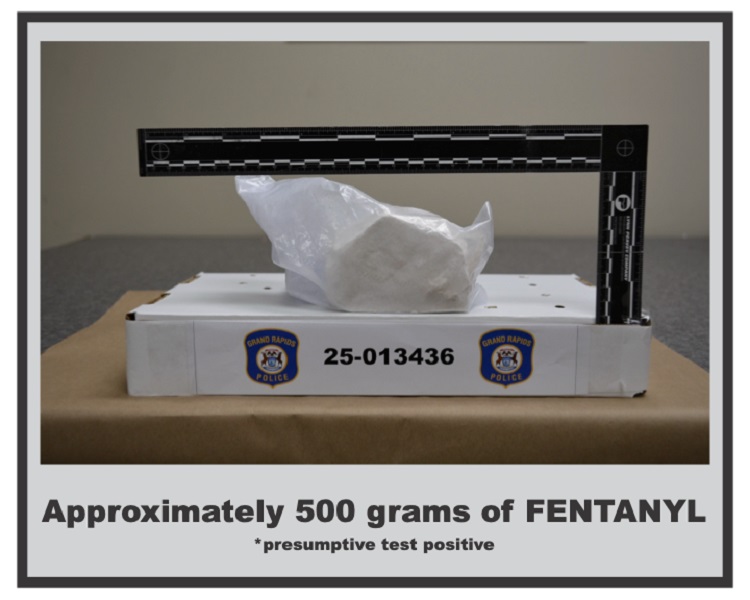GRAND RAPIDS, Mich. — In what is being called the largest drug seizure in the history of the Grand Rapids Police Department’s (GRPD) Vice Unit, authorities recently confiscated over 1.1 pounds of fentanyl. The bust, which occurred Monday, was part of a months-long investigation and took place at the Wimbledon Apartments off Canal Avenue SW in Grandville, a southwest suburb of Grand Rapids.
GRPD officials revealed that detectives found 500 grams of what is believed to be purified fentanyl and 250 grams of black tar heroin. The discovery is being described as a potentially catastrophic event for the local community. “This much fentanyl had the potential to kill every resident in the city of Grand Rapids and Grandville — up to 250,000 people,” said GRPD Deputy Chief Mike Maycroft during a Wednesday afternoon news conference.
Fentanyl, a synthetic opioid that is much more potent than heroin or morphine, is a major contributor to fatal overdoses across the U.S., including in Michigan. Authorities explained that even a small amount of fentanyl, as little as two milligrams, can be fatal. “Its potential harm could be very, very immense,” said Maycroft.
The arrest was made at the apartment where the drugs were seized, with 53-year-old Darrell Mitchell taken into custody. Mitchell has been charged with possession with intent to distribute. According to GRPD, he was already well aware of the dangers of fentanyl, as evidenced by the presence of a respirator in his apartment.
Mitchell, who served 17 years in federal prison for a prior drug conviction involving 1.5 kilograms of crack cocaine, was released earlier this year after completing his sentence. He is currently on federal probation. “This seizure took this extremely deadly substance away from an individual who is not a licensed pharmacist, who I’m sure his only experience is whatever he learned in prison for 17 years,” said GRPD Chief Eric Winstrom. “I have no doubt that this would have led to illegal sales of a deadly substance to numerous people in the West Michigan area.”
Mitchell faces a potential prison sentence of up to 30 years if convicted. During his arraignment, Judge Nicholas Christensen set Mitchell’s bail at $1 million, citing a significant flight risk and Mitchell’s lengthy criminal history, which includes eight prior felony drug convictions.
The fentanyl bust is just one example of the ongoing opioid epidemic in Michigan. In 2024, fentanyl was involved in 42% of the 71 overdose deaths recorded by the Kent County Medical Examiner’s Office. In 2023, fentanyl was linked to 60% of the 92 overdose deaths in the county. Nearly 75% of overdose deaths in the city of Grand Rapids involved fentanyl, according to GRPD officials.
As law enforcement continues to fight the opioid crisis, Maycroft noted that the investigation into Mitchell’s drug network is ongoing. “We know where a lot of this comes from: ingredients from China, it comes into Mexico, it’s manufactured there and somehow makes it over the border into our communities,” he said.
The GRPD has been using naloxone (brand name Narcan) to reverse overdoses, with officers administering the life-saving drug over 40 times in 2024 alone. The department has responded to over 180 nonfatal overdoses in the past two years, though Maycroft believes this number is likely much higher, as many overdoses go unreported.
As fentanyl continues to claim lives in the U.S., national overdose deaths involving the drug saw a brief decline in 2024, according to the Centers for Disease Control and Prevention (CDC). The drop was attributed to increased access to naloxone, better substance use treatment, and shifts in the illegal drug supply. However, overdose remains the leading cause of death for individuals between the ages of 18 and 44.
The GRPD’s efforts in combatting the fentanyl crisis are expected to continue, as law enforcement vows to target those responsible for distributing deadly drugs in the community.







